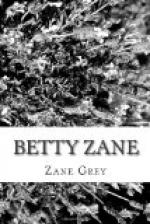The four Indians now returned to the fire and stood beside the chief. It was evident to them that his end was imminent. He sang in a low, not unmusical tone the death-chant of the Hurons. His companions silently bowed their heads. When he had finished singing he slowly rose to his great height, showing a commanding figure. Slowly his features lost their stern pride, his face softened, and his dark eyes, gazing straight into the gloom of the forest, bespoke a superhuman vision.
“Wingenund has been a great chief. He has crossed his last trail. The deeds of Wingenund will be told in the wigwams of the Lenape,” said the chief in a loud voice, and then sank back into the arms of his comrades. They laid him gently down.
A convulsive shudder shook the stricken warrior’s frame. Then, starting up he straightened out his long arm and clutched wildly at the air with his sinewy fingers as if to grasp and hold the life that was escaping him.
Isaac could see the fixed, sombre light in the eyes, and the pallor of death stealing over the face of the chief. He turned his eyes away from the sad spectacle, and when he looked again the majestic figure lay still.
The moon sailed out from behind a cloud and shed its mellow light down on the little glade. It showed the four Indians digging a grave beneath the oak tree. No word was spoken. They worked with their tomahawks on the soft duff and soon their task was completed. A bed of moss and ferns lined the last resting place of the chief. His weapons were placed beside him, to go with him to the Happy Hunting Ground, the eternal home of the redmen, where the redmen believe the sun will always shine, and where they will be free from their cruel white foes.
When the grave had been filled and the log rolled on it the Indians stood by it a moment, each speaking a few words in a low tone, while the night wind moaned the dead chief’s requiem through the tree tops.
Accustomed as Isaac was to the bloody conflicts common to the Indians, and to the tragedy that surrounded the life of a borderman, the ghastly sight had unnerved him. The last glimpse of that stern, dark face, of that powerful form, as the moon brightened up the spot in seeming pity, he felt he could never forget. His thoughts were interrupted by the harsh voice of Crow bidding him get up. He was told that the slightest inclination on his part to lag behind on the march before them, or in any way to make their trail plainer, would be the signal for his death. With that Crow cut the thongs which bound Isaac’s legs and placing him between two of the Indians, led the way into the forest.
Moving like spectres in the moonlight they marched on and on for hours. Crow was well named. He led them up the stony ridges where their footsteps left no mark, and where even a dog could not find their trail; down into the valleys and into the shallow streams where the running water would soon wash away all trace of their tracks; then out on the open plain, where the soft, springy grass retained little impress of their moccasins.




